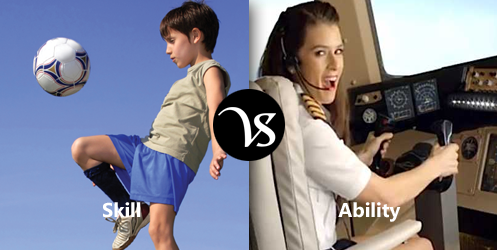 Skills:
Skills:
A skill is a learned ability to carry out a task or to do something. In other words, the abilities of that one possesses. Skills can be divided into domain-general and domain-specific skills.
Ability:
Ability is the skill to do something. Ability is more or less inherited or has a genetic background. Abilities are stable than the skills.
Differences:
| Basis | Skill | Ability |
|---|---|---|
| Definition (www.oxforddictionaries.com) | The ability to do something well; expertise | Possession of the means or skill to do something |
| Synonyms | Expertise, quickness, intelligence, competence and technique | Qualification, skill, strength, capacity and understanding |
| Antonyms | Ignorance, inability, lack, clumsiness and difficulty | Incapability, ineptness, weakness, incapacity and impotence |
| Types | The types of skills are:
|
Its types are:
|
| Word origin | It was originated from Late Old English scele ‘knowledge’, from Old Norse skil ‘discernment, knowledge’. | It was originated from Late Middle English: from Old French ablete, from Latin habilitas, from habilis ‘able’. |
| Obtained | Skill is learned. | Ability is more or less inherited or has a genetic background. |
| Performance | Skill is more goals directed because having such can allow a person to attain a higher level of performance. | Possessing abilities does not necessarily equate to exceptional performance. |
| Stability | Skills are less stable than ability. | Abilities are more stable than skills. |
| Pronunciation |
|
|
| Advantages/Benefits | Its advantages are:
|
Its advantages are:
|
| Example in Sentence |
|
|





